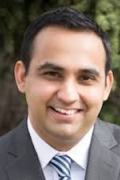
Sameer Hirji, MD
Sameer Hirji, MD, the Safra Research Fellow in the Division of Cardiac Surgery and a resident in the Department of Surgery, was recognized for his outstanding research by the American Association of Thoracic Surgeons (AATS) Foundation and the Massachusetts Chapter of the American College of Surgeons (ACS).
Hirji received the prestigious John W. Kirklin Resident Research Award from AATS Foundation for his project, “Utility and Feasibility of Intra- and Postoperative Crisis Management Checklists in Cardiac Surgery.”
Through a collaboration between the BWH Neil and Elise Wallace STRATUS Center for Medical Simulation and the Veterans Health Administration, Hirji and his colleagues demonstrated the unmet need for intraoperative and postoperative crisis-management tools in order for cardiac surgeons to recognize preventable errors in a timely fashion. The team also developed a checklist app that provides a standardized protocol to help improve cognitive performance during adverse events.
Established in 1973, the AATS Foundation works to achieve a dynamic and innovative future of continued excellence for cardiothoracic surgery. It is the philanthropic arm of the American Association of Thoracic Surgeons.
In addition to this honor, Hirji earned the Joseph Murray Resident Research Award from the Massachusetts Chapter of the ACS for his research on surgical and transcatheter aortic valve replacement among octogenarians.
The project, entitled “Outcomes of surgical and transcatheter aortic valve replacement in the Octogenarians – Surgery still the gold standard,” found that surgical aortic valve replacement had comparable outcomes to transcatheter approaches in select patients, adjusting for various patient-level factors. Hirji and his team noted that while procedural approach did not affect mid-term survival, a multidisciplinary-based approach was paramount to improving patient selection and outcomes.
Chartered in 1953, the Massachusetts Chapter of the ACS is a scientific and educational association that strives to improve the quality of care for the surgical patient by setting high standards for surgical education and practice.